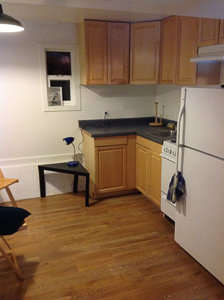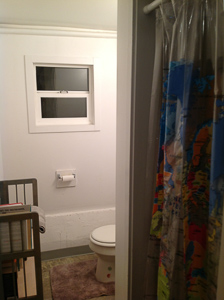Finding affordable, appropriate housing for our refugees is the most intractable, nagging, chronic problem the Guardian Group faces. The Bay Area is hugely expensive and the people we help have little money.
Here’s a bit more background on housing and the Guardian Group’s experience. We hope that after reading it, you’ll consider providing space for a refugee to live!
The Housing Problem
Government assistance for refugees and people granted asylum is pretty much the same all over the country. (Asylum seekers get no governmental help.) So, a refugee in Pocatello, Idaho gets basically the same public assistance as a refugee in San Francisco.
In addition, many straight refugees come in family groups. Each person gets their own allotment of assistance which the family can pool to get a bigger, better living space. In contrast, sexual minority refugees cannot live with others from their homeland because most other refugees are just as biased against them as the society in their home country.
One solution would seem to be to not try to resettle refugees in high-cost San Francisco.
But, many low-cost areas of the United States are also those where homophobia and transphobia are baked into the local culture. Even in the Bay Area, the services, public transportation, medical care, and social support vary significantly from city to city. San Francisco is a superior place for our refugees to live because of its Newcomer Refugee Clinic at San Francisco General Hospital, LGBTI-oriented neighborhoods like the Castro, the Healthy San Francisco program, and other “only in San Francisco” services.
So, the best place for sexual minority refugees to live is in high-cost, but supportive, communities like San Francisco. What a task!
What is Needed for Refugee Housing?

The relatively elegant private kitchen provided one refugee
Refugees don’t need elegant digs. They need a safe, private room and access to kitchen and washing facilities. Refugees also must pay some rent, about $200 a month, while Asylum Seekers and Asylees are able to accept — and would appreciate — donated space.
Here are some very-nice-to-have features of a refugee’s room:
- Close to the Castro/Downtown or easy access to an active MUNI line
- WiFi in the room that they can use
Housing arrangements can be for fixed terms or open ended. Most of our hosts have started with a commitment for two months. Many have then extended their offer to another two months or more. Some hosts cannot extend or do not want to… that’s okay. We are grateful for whatever people can provide.
The refugee’s room can be furnished or unfurnished.
What Surprises Hosts that Offer Refugees Housing?
We have discovered some common surprises that can cause disappointment or friction between a person offering housing and a refugee. Here’s what we’ve learned:
- There is an unconscious expectation that the arriving refugee will be like a high school foreign exchange student. Refugees are not happy teenagers visiting the United States on a lark! Here are some significant differences:
- Refugees have gone through a lot emotionally and physically. Some have PTSD. Others are “merely” depressed. They need support, quiet, and security. They are very likely NOT going to be bubbly, outgoing, and good at listening to your conversations.
- The refugees aren’t here because they woke up one morning and decided that they wanted to move to America. They are here because they had to flee their home. They cannot go back. Most refugees are homesick, lonely, and feel picked upon by fate.
- Refugees often cannot contact their families and friends in their country of origin. Or they were harmed by their family and friends when the family and friends found out the refugee’s sexual orientation. In either case, the cutting off of contact makes the refugee feel isolated.
- Refugees are older than exchange students. They are generally more established in their home country. They feel the loss of their professional status, educational credentials, and community.
- Older people — even those in their 20’s — are less adept at picking up the expectations of a foreign culture (ours). This means that refugees from some countries will always run late. Refugees from other countries will always say “Yes” to invitations, even though they have no intention of going to the event. (To say “no” would be offensive back home.) Understanding what these refugees really mean and really want can be a struggle! They may not be outgoing nor skilled at listening.
- A lot of what we do everyday is learned behavior and it will take a while for refugees to understand what’s expected. This can frustrate hosts. We had one host complain that the refugee living with her was deliberately putting the wrong type of refuse in the wrong color recycling bin. She was afraid that the city was going to fine her for having coffee grounds in the blue bin, and wondered why the refugee was trying to get her in trouble. Of course, the refugee was struggling to understand the whole concept of recycling and was trying to grasp the grand scheme of blue bins vs. green bins vs. black bins.
- Most of our refugees have lived in a space where the host still has furniture, decorations, books, or other possessions. Usually the hosts say the refugee can use anything in the room as if it were the refugee’s own property. But, people really don’t expect a refugee to do that! They don’t want notes in their books or the artwork on the walls rearranged. We recommend writing down a list of what’s in the refugee’s room and if/how the refugee can use the item.
- A similar understanding of the sharing of food and the kitchen should also be worked out. We’ve had hosts become upset after they told the refugee that he could eat anything and then the host discovered that the refugee ate the eggs the host had expected to use for a sauce at dinner. No one did anything wrong, but both the host and the refugee were uncomfortable.

Example of refugee space
While the the differences between cultures can be surprising, seeing our culture through the eyes of a person from a third-world country on the other side of the globe is also extremely revealing. And, interesting!
The Guardian Group works with hosts and refugees to establish a successful and rewarding housing experience. People who provide housing are doing a great good. They also are participants in a unique, once-in-a-lifetime experience: the acclimation of a refugee to San Francisco and America.
Please contact the Guardian Group for more information about helping a refugee live in San Francisco.

Pingback: New Page About Housing Added | Guardian Group of the 1st Unitarian Universalist Society of San Francisco